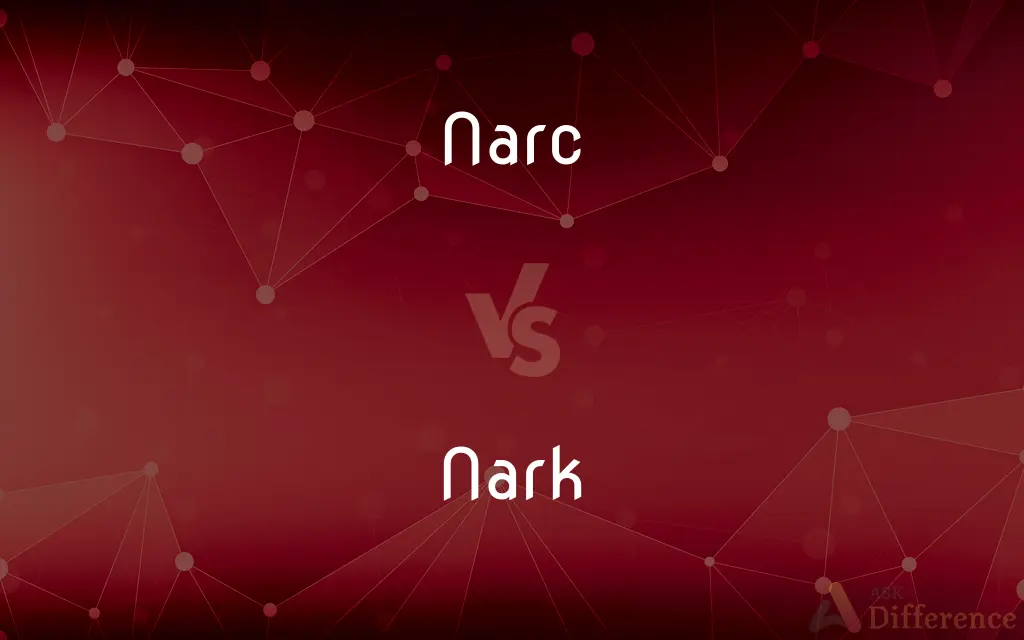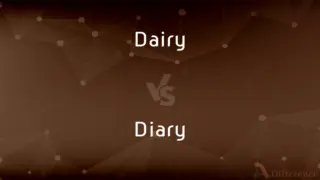Narc vs. Nark — What's the Difference?
Edited by Tayyaba Rehman — By Fiza Rafique — Updated on April 4, 2024
"Narc" typically refers to a narcotics officer or informant in American English, while "Nark" is British English for an informant or spy, especially in a non-police context.

Difference Between Narc and Nark
Table of Contents
ADVERTISEMENT
Key Differences
"Narc," short for narcotics officer, is primarily used in American English to describe law enforcement agents involved in the suppression of drug trafficking. On the other hand, "nark," used in British English, often refers to an informant or spy, particularly one used by the police, but can also mean someone who spoils the fun.
The term "narc" has a specific association with law enforcement and drug-related crimes, embodying the efforts to combat drug trafficking. In contrast, "nark" has a broader usage in British English, denoting anyone who informs authorities about illegal or illicit activities, or even just someone who complains or spoils enjoyment, without necessarily being limited to drug-related contexts.
While "narc" is closely tied to the context of narcotics and the police officers or informants involved in these cases, "nark" can also be used more generally to describe a traitor or informant in various situations, not just those involving the police. This distinction highlights the different connotations and usage of the terms in American and British English.
The origins of "narc" come from the abbreviation of "narcotics officer," a term used in the United States to refer to police officers who specialize in drug crimes. Meanwhile, "nark" originates from 19th-century British slang, possibly derived from the Romani word "nāk," meaning nose, used metaphorically to refer to someone sniffing out information.
Narc and "nark" can sometimes be used interchangeably due to the globalization of English, their distinct origins and connotations in American and British English respectively serve different narrative and linguistic purposes, reflecting the cultural nuances of language use in different English-speaking regions.
ADVERTISEMENT
Comparison Chart
Definition
A narcotics officer or informant, especially in drug-related cases.
An informant or spy, often used in non-police contexts in British English.
Origin
American English, related to narcotics law enforcement.
British English, from 19th-century slang with possible Romani roots.
Context of Use
Primarily in relation to drug enforcement and trafficking.
Broader usage, including informants in various situations or someone spoiling fun.
Connotation
Specifically linked to drug crimes and law enforcement.
Can denote a traitor, informant, or complainer more generally.
Linguistic Variation
Used in American English.
Predominantly used in British English.
Compare with Definitions
Narc
Refers to a narcotics officer.
The narc led the drug bust.
Nark
Can mean someone who spoils fun.
She's a real nark, complaining about the music.
Narc
Can also mean an informant in drug cases.
The dealer didn't know he was selling to a narc.
Nark
Not limited to drug-related activities.
He became known as the office nark for reporting minor infractions.
Narc
Used in contexts of drug enforcement.
Narcs often work undercover.
Nark
British slang for an informant.
He was labeled a nark after talking to the police.
Narc
Predominantly American English term.
The term narc is common in American crime dramas.
Nark
Often used outside of police contexts.
Don't be a nark by telling the boss about the party.
Narc
Closely associated with narcotics.
He works as a narc, focusing on meth labs.
Nark
Common in British English.
Nark is more often heard in the UK than in the US.
Narc
A law enforcement officer, usually one working undercover, who deals with narcotics violations.
Nark
A police informer
I'm not a copper's nark
Narc
An informer; a snitch.
Nark
An annoying person or thing.
Narc
To act as an informer; snitch.
Nark
Another term for narc
Narc
A police officer or federal agent assigned to or engaging in illegal narcotics control.
Nark
Cause annoyance to
Women like her nark me
Narc
Alternative spelling of nark
Nark
Variant of narc.
Narc
A narcissist.
Nark
An informer, especially a police informer.
Narc
Alternative spelling of nark
Nark
To be an informer.
Narc
To suffer from impaired judgment due to nitrogen narcosis (for example, while scuba diving).
Nark
A police spy or informer.
Narc
A lawman concerned with narcotics violations
Nark
An unpleasant person, especially one who makes things difficult for others.
Nark
Alternative form of narc.
Nark
To watch; to observe.
Nark
To serve or behave as a spy or informer.
“If you nark on me, I’ll rip your arms off,” said Tim to his brother, as he passed him a joint.
Nark
To annoy or irritate.
It really narks me when people smoke in restaurants.
Nark
To complain.
He narks in my ear all day, moaning about his problems.
Nark
To stop.
Nark it! I hear someone coming!
Nark
A law enforcement agent specializing in narcotics law violations.
Nark
An informer or spy working for the police
Nark
A lawman concerned with narcotics violations
Nark
Cause annoyance in; disturb, especially by minor irritations;
Mosquitoes buzzing in my ear really bothers me
It irritates me that she never closes the door after she leaves
Nark
Inform or spy (for the police)
Common Curiosities
Can "nark" be used to describe a police informant?
Yes, "nark" can describe a police informant, especially in British English, but its use is broader than just law enforcement contexts.
How did "nark" come to mean someone who spoils fun?
The evolution from informant to spoilsport likely stems from the negative perception of informing, extending to anyone who disrupts enjoyment or complains.
Is "narc" used outside the United States?
While "narc" is primarily an American term, it can be understood and used in other English-speaking countries due to American media influence.
Are there legal implications to being a "narc" or "nark"?
Being an informant can have legal and personal safety implications, but the terms themselves are slang without legal definition.
What's the difference in connotation between "narc" and "nark"?
"Narc" specifically relates to narcotics and drug enforcement, while "nark" has a wider range of meanings, including informants in non-drug contexts and complainers.
What does "narc" stand for?
"Narc" is short for narcotics officer or informant, particularly in drug-related contexts.
Is it offensive to call someone a "nark" or "narc"?
Both terms can be seen as derogatory, depending on context, as they imply betrayal or informing on others.
Is there a difference in the way "narc" and "nark" are viewed in society?
Yes, societal views vary, with "narc" often seen in a more negative light due to its association with drug enforcement and betrayal, while "nark" has a broader, sometimes less negative, range of meanings.
Can someone be called a "narc" for informing on non-drug related activities?
Typically, "narc" is used in the context of drug-related activities, though its usage can be broader in informal speech.
How do movies and TV shows influence the perception of "narcs" and "narks"?
Media often portrays "narcs" and "narks" in a dramatized manner, influencing public perception and understanding of the roles.
Share Your Discovery

Previous Comparison
Dairy vs. Diary
Next Comparison
Cappuccino vs. LatteAuthor Spotlight
Written by
Fiza RafiqueFiza Rafique is a skilled content writer at AskDifference.com, where she meticulously refines and enhances written pieces. Drawing from her vast editorial expertise, Fiza ensures clarity, accuracy, and precision in every article. Passionate about language, she continually seeks to elevate the quality of content for readers worldwide.
Edited by
Tayyaba RehmanTayyaba Rehman is a distinguished writer, currently serving as a primary contributor to askdifference.com. As a researcher in semantics and etymology, Tayyaba's passion for the complexity of languages and their distinctions has found a perfect home on the platform. Tayyaba delves into the intricacies of language, distinguishing between commonly confused words and phrases, thereby providing clarity for readers worldwide.













































